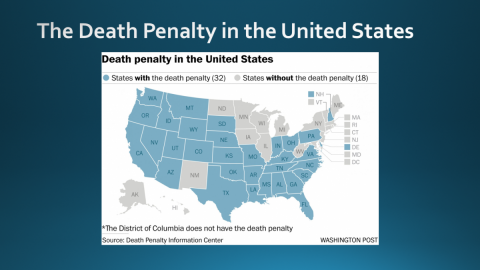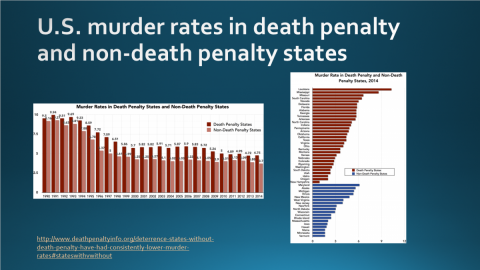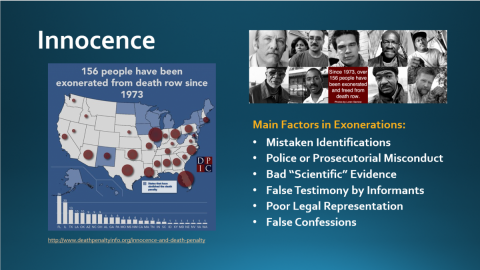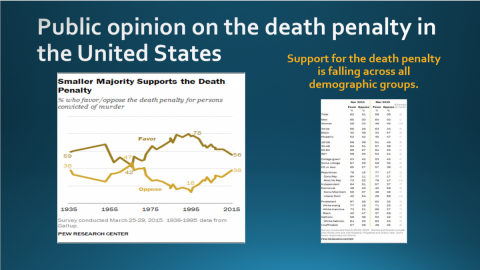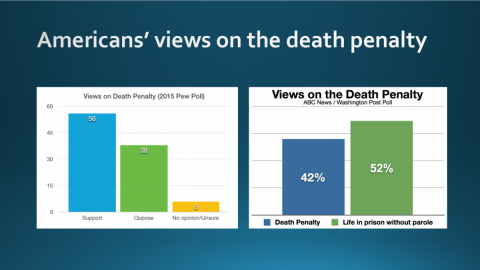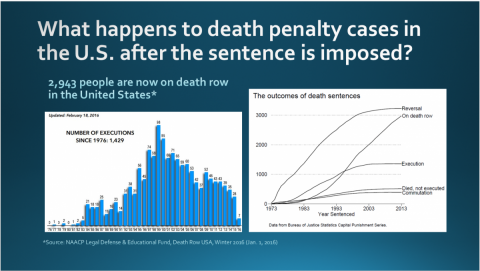US expert: People face incorrect question in votes on the death penalty
Robert Dunham, executive director of the Death Penalty Information Center, who took part in the thematic conference in Minsk, told the Human Rights Center "Viasna" about the evolution of public debate on the death penalty in the United States and shared his views on this issue in Belarus.
Viasna: Our campaign called “Human Rights Defenders Against the Death Penalty in Belarus” focuses on the arguments for and against the death penalty. So could we discuss the most common ones? Is the death penalty a deterrent to crime? It is essential to hear an answer to this question in the context of the United States, where, as we all know, death sentences were not executed for a decade between 1967 and 1977, and today the death penalty is abolished in 18 out of the 50 states.
Robert Dunham: This is an important question. Firstly, it should be noted that there is no evidence that the death penalty is a deterrent. And the National Academy of Science of the United States was asked to take a look at various studies that had claimed that the death penalty was a deterrent. What they found is that there is no valid evidence that it was. And all the studies that had suggested that it might be a deterrent had very significant flaws. When they took a hard look at the evidence, their conclusion was there is no scientific evidence that allows anybody to say with certainty what effect the death penalty has at all. Very recently, the Brennan Center for Justice at New York University conducted a study on what kind of factors influence crime. They looked at dozens possible factors including the death penalty. And they found that if you have the death penalty or you don’t have it has no effect on murder rates.
In addition, we have seen that there are social trends that exist across the country and across the world. And when murder rates go up in society in general, they go up in states that have the death penalty and in states that don’t have it. And if they go down, they go down in states that have the death penalty and in states that don’t have the death penalty.
And, interestingly, when you look at the murder rates in the United States, they are actually higher in states that have the death penalty, as opposed to states that don’t. And you wouldn’t expect that if it was a deterrent.
Viasna: You used to be a lawyer working on cases where people were sentenced to death. So, probably, your practice proved that at the time of committing the crime your clients were not thinking that they might be punished by death. At least, our lawyers often say so. After all, the murderer is in a completely different mental state, or, as it often happens in Belarus, is under the influence of alcohol.
Robert Dunham: Whether it’s an act in an altered state, whether it’s an act out of rage, I have never had a client who is guilty, who was thinking for a second about possible punishments. Many of the people who go to death row who commit murders aren’t actually thinking about committing a murder until the instant that it happens. So, they are certainly not thinking about what the punishment is going to be. When you have people who are emotionally impaired or people who have intellectual disabilities or people who are mentally ill, they are not thinking about that. And the people who are innocent are not certainly thinking about the punishment.
Viasna: From the victim’s point of view, the death penalty is perceived as retribution for committing a crime. And the principle of ‘an eye for an eye, a tooth for a tooth’ looks rather compelling. How does American society react to it? And do you think the argument should be taken into account by politicians?
Robert Dunham: Of course, if your loved one has been killed, you are going to be angry. That’s natural. And if someone close to me were killed, I would be extraordinarily angry myself. But the reason we have laws is so we all give in to anger. The reason we have laws is to have society better off in the long run. And vengeance is not a valid reason to have a punishment. Vengeance is also useless if you are killing the wrong person. So unless you are able to eliminate the possibility of error, then it becomes a reason that makes it easier to tolerate mistakes. If you are going to act out of vengeance, you tend to act first and get it right later. But if you are going to execute somebody, you don’t have the chance to get it right later.
There’s also no evidence that the death penalty helps family members heal. And there’s certainly no evidence that it helps family members heal more than a strong life sentence does. And after executions occur, what we sometimes see is that the family members feel shame and guilt that they have participated in a system that has taken somebody else’s life. Even if they were angry, it doesn’t make them feel better, it doesn’t bring back their loved one. And many of them feel dirty from having participated in this process that’s ended up killing another human being. And where do you go with the guilt? Where do you go with the shame? It’s with you for the rest of your life.
There’s a really interesting study that was done and we need to see more of this. It was a study of family members of murder victims in the state of Texas, which has the death penalty and aggressively uses it, and the state of Minnesota, which doesn’t have the death penalty. The researchers followed the family members from the time that the prosecution decided whether it was going to seek the death penalty in Texas through the time of an execution or the end of a legal process. And it followed the family members in Minnesota from the beginning of the legal process to the end. What they found was that at every stage of the process, from the beginning to the end, the family members in Minnesota, where there was no death penalty, were healthier, physically, psychologically and emotionally. And the fact was that the death penalty was bad for the family members of the victims. Whether or not they wanted the death penalty, it was bad for them. I would like to see the study done, but there’s no reason to believe that the family members of murder victims in Holland are worse off than the family members of murder victims in Belarus.
Viasna: In Belarus, the very fact of the death penalty is assessed by the state as an act of justice, and the government does not care about what happens to the victim’s family. Of course, the family members of murder victims very often want the death penalty in the courts. And you rightly pointed out that the murder of a loved one causes anger, and this can turn anyone into an animal willing to retaliate and kill out of revenge. But we have laws to prevent this. Otherwise, people could kill without trial, if this were justice.
Robert Dunham: What we see in other countries is that the family members of victims want the severest punishment that the law allows. In a country, in which they don’t have the death penalty, the family members will ask the prosecutors to impose the longest sentence that’s available. And they will do that out of the same rage, the same sense of retribution, and there is no indication anywhere that society’s any worse off for having that option instead of the death penalty. And there’s no indication anywhere that the victims’ families in those countries are any worse off that the victims’ families in countries that have the death penalty. And the upside is that you don’t run the risk of taking somebody’s life out of misplaced fear or out of bias or by complete mistake.
Viasna: Probably, the public opinion in any country will always support the retention of the death penalty. What should the political elite do in such a situation? The Belarusian authorities have always referred to the 1996 referendum, when most people said “Yes” to the death penalty, and we heard this again during the conference. But, at the same time, they take other unpopular measures, without consulting with the citizens, not taking their opinion into account.
Robert Dunham: There are several things that we’ve seen about the public opinion that suggest very strongly that what the public thinks now is very different from what the public thought 20 years ago. And certainly that’s the case of the United States. 20 years ago, 80 % of Americans said that they supported the death penalty. Last year, it was 56 %. That’s a huge change.
And that’s even not asking the right question. And the question isn’t “Are you for or against the death penalty?”, it’s “Are you for the death penalty as compared to what?” I mean the person is not going to be free if we don’t give him the death penalty. So if you ask the other question, “Which is the better punishment for murder? Death of life sentence?”, you get a different answer. And the majority of Americans now say that life without parole is the preferable punishment to the death penalty. So you have a majority who say they support the death penalty. But the majority prefers not having the death penalty when life without parole is the option. And it’s not just the views changed over time. It’s a different generation with different views. And what we see in the United States is the younger you are the less likely you will support the death penalty. If that’s the case in Belarus, then that part of generation was not included in the poll.
Viasna: My last question is why you found it interesting to participate in the conference on the death penalty in Belarus? What did your speech deal with?
Robert Dunham: The Death Penalty Information Center is a non-governmental organization that studies the death penalty. We provide information and analysis, mostly about the death penalty in the United States. When the UN and the Belarusian Foreign Ministry put together this conference, they were interested in having a discussion. And they wanted to hear not just from the countries that didn’t have the death penalty, but also from the countries that did have the death penalty. And if they only had other people from Europe, there would have been a sense that they were just being lectured at. And nobody likes to be told what to do, especially by outsiders. Especially by outsiders who you might feel are coming from a position of moral superiority. But I think when people actually hear the way the death penalty works in the United States or, more accurately, how it doesn’t work, they had better information to make their own decisions on. But this wasn’t the US government saying anything. We don’t talk for the government. We don’t represent the government. We disagree with the government fairly often. I wanted to be able to tell the truth about what the situation in the United States was and help Belarus make up its own mind.
There’s one thing that I find really interesting. Governments do not like other governments to tell them what to do. Belarus does not like Europe saying what it should do. Texas does not like Europe telling it what to do. And in the United States, most of the executions are using lethal injection drugs. The American drug companies do not want their medicines to be used to kill people. So the pharmaceutical companies are refusing the sell the drugs to the prisons, and the prisons are having difficulty finding the drugs to kill the inmates. So the states are trying to get them in Europe. And Europe says that the death penalty is a human rights violation and it would not let companies on this continent sell drugs for that purpose. And there are export regulations that ban sending medicines to the United States to kill people. My sense is that pressure is contributing to the debate in the United States, the same way that the European opposition to the death penalty is contributing to the debate in Belarus. And there may be a different power relationship between the United States and Europe and Europe and Belarus. But I think that the dynamic is pretty similar. And what we are seeing essentially is that the United States is state by state coming to hold the same view as the rest of the world. The states are individually catching up with the rest of the world in their views about the death penalty. It’s a process that evolves. And I think that what we are seeing here is that Belarus is in the process of having its views evolved, too. But, just as in the United States, they will grow and change on the right time.
The interview features slides from a presentation Robert Dunham demonstrated at the conference in Minsk.




